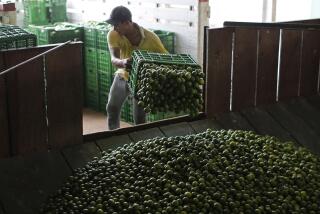Troops Sent to Help End Banana Strike : Honduras: At least 3 are wounded. The government summons both sides to resume talks.
- Share via
LA LIMA, Honduras — Reeling from Honduras’ costliest labor feud in 36 years, the civilian government sent army troops onto banana plantations and censored radio broadcasts Sunday to help an American multinational fruit company end a seven-week-old strike by 10,000 workers.
Two workers and an undercover police officer were wounded outside the Chiquita Brands headquarters here when a soldier fired his machine gun into an angry crowd Saturday night. Tension prevailed Sunday as 30 truckloads of strikebreakers moved out from the headquarters to banana fields on Honduras’ tropical north coast.
But the effort was only partly successful, and the government summoned both sides to resume wage talks. A company field organizer said some of the 2,800 workers on the trucks had entered five of the 24 idled plantations to harvest bananas. At other plantations, reporters saw the trucks turned away by pickets, despite army escorts.
The bitter dispute involves the world’s largest banana company, formerly United Fruit, whose clout in Honduras gave this country, the poorest in Central America, its infamous “banana republic” label. The strike has provoked President Rafael L. Callejas’ first crisis by threatening a carefully managed program of national economic recovery.
Bananas earn more than a third of Honduras’ export dollars, and Chiquita’s subsidiary here, the Tela Railroad Co., produces the lion’s share. In an interview last week, Callejas said the strike against the country’s largest private employer was having “a terrible impact”--$18.5 million in lost exports and uncollected taxes.
“We want to be a banana republic, but not in the pejorative term of the past,” Callejas said. “We want to produce more bananas. We should become the largest producer of bananas in the world.”
After taking office Jan. 27, Callejas helped broker a Nicaraguan peace accord that rid Honduras of 14,000 unwanted Nicaraguan rebels. By moving boldly against the overvalued lempira, which had traded at 50 U.S. cents since 1918, and by raising taxes, he restored Honduras’ credit with foreign lenders.
But the cost of the 50% devaluation was a corresponding burst of inflation that riled Honduras’ well-organized unions. Callejas has moved cautiously, canceling a milk price increase in the face of popular outcry and trying to mediate the dispute over banana wages, which have not risen in five years.
The banana union, born in a 69-day strike in 1954 that crippled the country and won workers the right to organize, is one of Honduras’ most privileged and most militant. It faces a company that has been trying for decades to destroy it.
Claiming the devaluation halved Chiquita’s labor costs, the union on Friday rejected a government-proposed 25% boost in the $3.81 daily wage that Chiquita had accepted. The union is demanding 30%.
“We work for a foreign company making millions of dollars, and all we’re asking for is small change,” said Horacio Cruz, 61, a 1954 strike veteran. “The government is still on the side of the rich.”
The government backed the company after banana union leaders asked other workers to support them with a nationwide strike this week. To muffle that appeal, Callejas ordered radio stations to limit news to official communiques.
More to Read
Sign up for Essential California
The most important California stories and recommendations in your inbox every morning.
You may occasionally receive promotional content from the Los Angeles Times.













